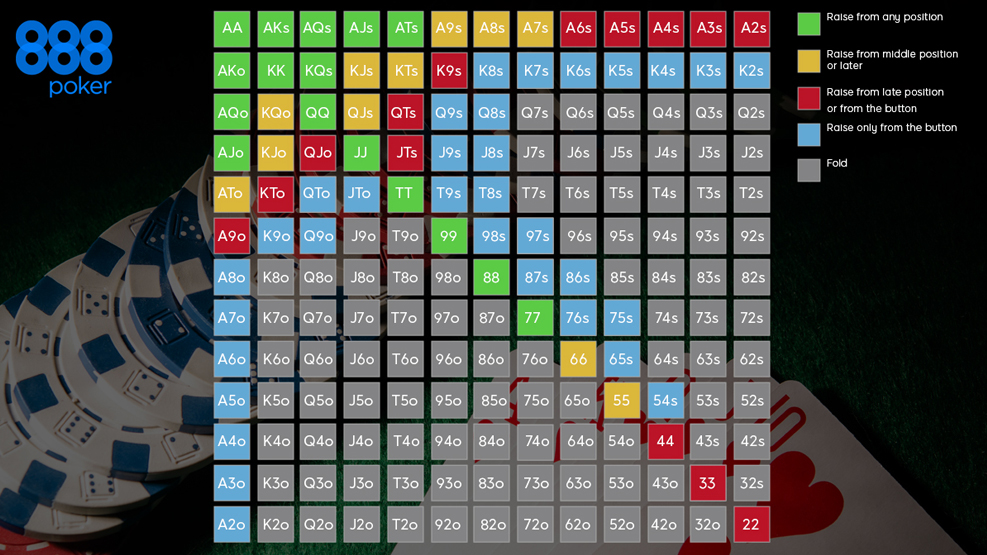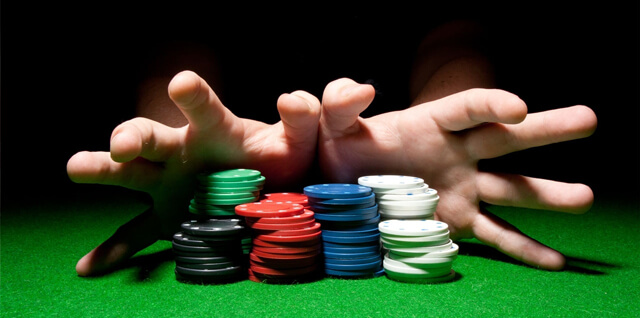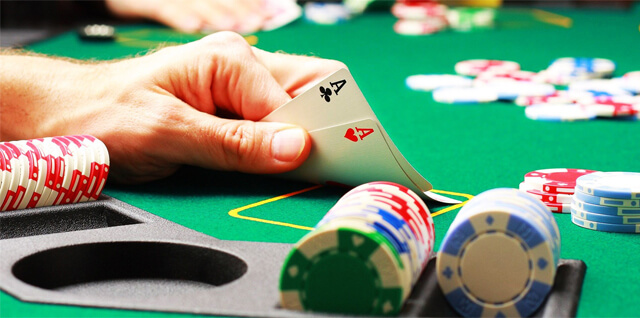Essential Texas Hold’em Moves If you want to win at poker you need to understand the basics — odds, outs, equity, hand values, position, etc. But there are also a handful of “special” moves that can make a big difference in your long-term poker win-rate. Dec 11, 2020 Texas Hold'em combines your two hole cards with the five community cards. The player with the best 5-card hand (out of 7) including BOTH hole cards wins the pot for that round. What's the most common winning hand in Texas Holdem? The hand rankings are placed in that order for a reason. A lot of Texas Hold 'Em strategy is based on the cards in your hand. You must be willing to suffer through a series of poor hands (e.g. 5-8, 2-6, 4-9) without getting impatient. The good hands will come, eventually, and you'll be in a better position to take advantage of them if you don't waste your chips trying to get something out of nothing. There are essentially five key strategic areas that you will need to focus on when you play Texas Hold’em cash games. For Texas Hold'em tournament strategy, there exists a whole set of other poker tournament tips. While there are many things that add up to good poker strategy, we feel that these are the Top Five for new or intermediate players. So here’s the formal definition of poker: Poker is a family of card games where individual players compete to see who can win the most money or chips over the long term. Ultimately, your goal as a player should be to figure out how to win more money. In this guide, we will focus on Texas Hold’em since it is the most popular game today.

Poker is a simple game. Or so it seems at first. But you soon realise it is full of nuance. To be successful you need a beginners poker strategy to play better Texas Holdem poker.
This guide will help you to work out how to get better at poker, what hands to play when, and is essential for beginners and useful for intermediate players.
Poker strategy for beginners; Position
One of the most important things to understand is position on the table and how to play it. The best position to be is the dealer, as pre-flop there are only two players to act after them and post flop they are the last person to act, which means they get to see what their opponents do. This yields a massive advantage, and means that pre flop you can afford to play weaker, or any, hands, and get away with a big bet post flop which allows you to take the hand down, depending on the action before. If you want to know how to get better at poker then understanding positional play is the first step.
Table position cuts down a lot of hands you might want to play. That’s because if you are in an early position on the table, even with good starting hands, you might have to throw them away, and your chips. The reason being if you don’t hit the board on the flop and there are big bets in later positions you will have to fold. That is why it’s good to get to know optimal starting hand play by position. Check out the table below and along with the winning hand rankings we have been through, memorise it.
Hands in the first four positions. (Small blind, big blind, UTG and UTG+1);
| Pairs | Suited | Unsuited |
| Sevens to Aces | Ace with K,Q,J,10 | Ace with K,Q,J,10, |
| K with Q,J,10 | King with Q,J | |
| Queen with J,10 | ||
| Jack with 10,9 | ||
| Ten with 9 |
Hands in the middle positions;
| Pairs | Suited | Unsuited |
| Fives, sixes | Ace with 9,8,7,6 | King with 10 |
| King with 9 | Queen with J,10 | |
| Queen with J,10 | Jack with 10 | |
| Jack with 8 | ||
| Ten with 8 | ||
| Nine with 8 |

Late position opening hands. Dealer, the cut-off, the cut-off +1;
| Pairs | Suited | Unsuited |
| Fours, threes, twos | Ace with 5,4,3,2 | King with 9 |
| King with 8,7,6,5,4,3,2 | Queen with 9 | |
| Ten with 7 | Jack with 9,8 | |
| Nine with 7,6 | Ten with 9,8 | |
| Eight with 7,6 | Nine with 8,7 | |
| Seven with 6,5 | Eight with 7 | |
| Six with 5 | ||
| Five with 4 |
Poker strategy for beginners; Folding
You shouldn’t be playing too many hands. Generally about 15% is recommended when you start playing poker, which means you are throwing about 85% of your hands away. This is very frustrating when you want to play and have fun. As you get better and learn a bit more about the play you can open up slowly and play a broader range, increasing the percentage of starting hands. But poker is about mathematical probabilities, and while playing the four and six of clubs in early position might end up getting you a big hand, most of the time it won’t, and you will lose way more by constantly playing hands like this than you will win over time. If you want to make that sort of play, you have to act as if you are starting with a pair of aces, then follow it through post flop, turn and river, but you only have to get one person not believing you – and some players are very good at reading your likely cards – and you will be in all sorts of trouble.
So be prepared to fold. Beginners call bets way too often, why not after all its fun, but most will get crushed and give their chips or cash away. This is basic Texas Holdem strategy.
Poker strategy for beginners; Aggression
If you want to know how to win at Texas Holdem poker, aggression should be your friend. When you have the right cards, this is a basic poker strategy for beginners. We have established that you should only be playing a small percentage of the hands you get, but when you do get them, you need to be aggressive. You need to be betting and raising, not just calling other peoples bets. A poker axiom is ‘never a caller be’. If you start with pocket pairs (a pair in your hand, i.e. AA, KK, QQ, etc), raise pre-flop. There are many reasons for this and one is that you want to eliminate marginal hands that players might limp in with in the hope of hitting two pair or better. If you limp in the pot with a big hand hoping to make a disguised big hand, you might, but not very often. Take control and raise pre-flop.
Poker strategy for beginners; C-Betting
If you raise with high cards and the flop is below them, hit the board hard with more chips. This is called a continuation, or C-bet. You raised, representing strength, and you follow it up with a C-bet to hammer home the point. If your pair is mid range and higher cards come on the flop, think carefully about what to do. Could the other person have hit? It might be worth putting out a good sized seed bet to see if the other players fold, and if you are prepared to call a twenty dollar bet you should be making the bet. You need to make the other person have to think about their action. You don’t want them making you think about yours. If you get re-raised you let your hand go, and if you get called and it goes to the river, you take it very easy and carefully consider your next action. You don’t want to keep leaking chips.
If you are in late position with your premium hand, and you don’t hit, but the table checks around to you, this is a good position to C-bet, because you probably do have the best hand, and even if you don’t, the other players can’t call your bet if they also hit nothing. But in early position, you can’t do that action because you don’t know what the players behind you will do.
And then…
On the turn keep on betting if you have a good hand and you don’t feel your opponent has a good hand. If your opponent is aggressively playing their cards, be prepared to fold. The worst thing you can do if you haven’t made a hand yet, is to check – call, you are throwing chips away. And if you have made a really good hand, the best thing you can do is check –raise, which gets your opponent thinking and wins you pots.
Poker Texas Facebook
Keep your game simple and clean. If you think you have the best hand or have a really good draw to a straight or flush, bet. Build the pot so when you win its full. Otherwise be prepared to throw your cards away to an opponent’s bet. It’s a lot to learn but you have to understand it if you want to understand how to master poker.
Poker strategy for beginners; Bluffing
You might be thinking that if you want to play better Texas Holdem poker you should bluff a lot. It might seem like a strategy to win in poker, but it isn’t and you shouldn’t. What we are talking about here is big bluffs for big pots, not the C-bets when you are in position and haven’t hit. Most professionals don’t bluff much, and neither should you. If you do at all, it should only be once or twice in a game. There is a saying in poker you need to pay attention to; ‘you can’t bluff a fish’. This means that if there is a poor or inexperienced player in the hand you shouldn’t try to bluff them because they will either fail to recognise the possibility that you have a great hand, or they will say to themselves ‘Lets have some fun and see if I can improve my tiny hand’, and they call anyway with their low hand. And you lose all your chips.
Poker strategy for beginners; Summary of the best poker strategy
- Be prepared to fold. A fold made is chips saved. You don’t get many great hands in Texas Holdem poker. You should be throwing a lot of hands away. Patience is a valuable asset when you start to play.
- Position is vital. Don’t play many hands in early position. Play a wider range in later position.
- Aggression wins games. When you have good starting hands, or a good hand on the board, be aggressive.
None of this guarantees you will win in poker, because you can do all the right things and you still lose. There is no single strategy to win in poker; you have to adapt. In this way you will learn how to master poker. As well as understanding the above poker strategy for beginners, the best answer to ‘how to get better at poker’ is to play, and learn the best poker strategy for you from experience.
Want to learn Omaha poker strategy? Look here.

|
| |
|
|
|
|
|
Higher Level Poker.

The following are more advanced strategy articles written by Jack Wilcox, who was a winning cash game player up to $400NL. They were originally posted on his Higher Level Poker training site for small/micro stakes players.
These strategy articles make use of player stats like VPIP/PFR.
| Title | Author | Category | Level | Date |
|---|---|---|---|---|
| Calling From Blinds vs. A Steal | Jack Wilcox | General | Intermediate | 26 Feb, 2011 |
| Semi-Bluffing By Raising All In | Jack Wilcox | Plays | Advanced | 26 Feb, 2011 |
| 3Betting Preflop In The Micro Stakes | Jack Wilcox | Plays | Intermediate | 27 Feb, 2011 |
| The Real Objective Of Poker | Jack Wilcox | Psychology | Beginner | 27 Feb, 2011 |
| Continuation Betting | Jack Wilcox | Plays | Beginner | 26 Mar, 2011 |
| 4Betting Mathematics | Jack Wilcox | Mathematics | Advanced | 28 Mar, 2011 |
| Check-Raising As A Bluff | Jack Wilcox | Plays | Intermediate | 1 Apr, 2011 |
| Attacking 3Bettors | Jack Wilcox | General | Advanced | 3 Apr, 2011 |
| Preflop Opening Ranges | Kyle Garner | General | Beginner | 14 Apr, 2011 |
| Floating The Flop | Jack Wilcox | Plays | Beginner | 14 Apr, 2011 |
| Breaking Down Your Winrate | Jack Wilcox | General | Intermediate | 9 May, 2011 |
| Winning Money From Bad Players | Jack Wilcox | General | Intermediate | 22 Oct, 2011 |
| Playing Blind vs. Blind | Jack Wilcox | General | Advanced | 25 Oct, 2011 |
| The Importance Of Position | Jack Wilcox | General | Beginner | 6 Nov, 2011 |
| Relative Hand Strength | Jack Wilcox | Concepts | Beginner | 6 Nov, 2011 |
| 5 Tips To Improve Your Game | Jack Wilcox | General | Beginner | 29 Nov, 2011 |
| Objectivity In Poker | Kyle Garner | Psychology | Intermediate | 5 Dec, 2011 |
| Optimal Bet Sizing | Johnathan Chan | Concepts | Beginner | 20 Jan, 2012 |
Using Texas Hold'em strategy articles.
When it comes to Texas Hold'em strategy, it's not about how much you read, it's about how much you learn.
Every time you read a Texas Hold'em strategy article, you should be actively trying to absorb the information as you go along. It's all well and good reading a whole bunch of articles, but if nothing is sinking in or making a real difference to the way you play, then it's going to be pretty useless.
If you actually take the strategy from this site on board and use it during play, I don't see any reason why you can't win money from Texas Hold'em. Winning money from Texas Hold'em is pretty straightforward when you know how.
Is this Texas Holdem strategy any good?
Or, to put it another way, why should you take strategy advice from me?
Poker Texas Game
I have been playing winning poker for a number of years. I'm not the God of Texas Hold'em strategy (I'm working on it), but the advice in these Texas Hold'em strategy articles has allowed me to consistently win money right up to the mid to high stakes tables. I like to think that's a good enough reason to trust my articles!
If you want more information and find out who I am, have a look at the about me page.
Poker Texas Joc
Even though I am very confident that the strategy on this site is of great quality, I always recommend exercising a little common sense when it comes to Texas Hold'em strategy and tips. Anyone can write poker strategy and post it on the Internet, but that doesn't make it good strategy. Think about what you're reading, and if it makes sense to you then perfect. It's a great idea to take advice from other successful players, but it's even better to use your head at the same time.